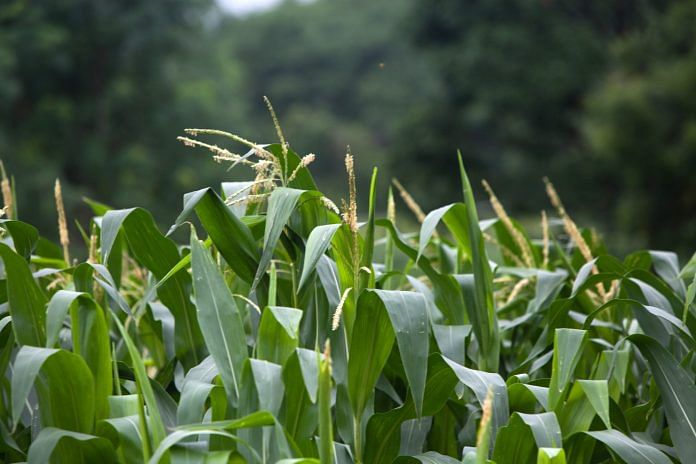New Delhi: The Modi government’s decision to import maize and milk under reduced import duties has irked domestic producers of the two products as local prices have already been crashing.
The government has in a notification dated 23 June allowed the import of 5 lakh MT of maize and 10,000 MT of milk and milk products at a concessional customs duty of 15 per cent each under the Tariff Rate Quota Scheme.
India normally imposes a 50-60 per cent import tax on the grain and has been the world’s seventh-biggest maize producer and net exporter till two years ago. The import duty on milk and milk products also varies from 30 to 60 per cent.
The government notification, however, states that it has reduced duties in the backdrop of India’s commitment to the World Trade Organization (WTO) for a few commodities.
The notification has rattled maize farmers across the country as domestic prices of corn have crashed in the country post the Covid-19 lockdown. Maize accounts for 60 per cent of chicken feed by weight and the poultry sector along with starch manufacturers are the major consumers of the crop.
But with the poultry industry having taken a huge hit amid the Covid crisis, the demand for feed and the prices of the crop have fallen drastically. The market prices of major poultry raw materials such as maize have dipped by more than half over the last few weeks causing severe distress to farmers.
Ajay Vir Jakhar, chairman of Bharat Krishak Samaj (Farmers’ Forum, India), told ThePrint that maize prices have fallen sharply. “When farmgate maize is selling 40 per cent below MSP, the timing of reducing import duty even if to be WTO compliant is unwise. This is counterproductive to aims of doubling farm income by 2022 and of the PM’s Atma Nirbhar agenda,” he said.
Also read: Over 1.5 crore farmers yet to receive PM-Kisan instalment after Covid lockdown
Farmers also hit by lack of demand, no procurement
In the absence of market demand and procurement from government agencies, maize farmers are being forced to sell their produce at Rs 1,000 to Rs 1,200 per quintal in the market. The lack of government procurement has really hurt farmers as the minimum support price (MSP) of this crop was hiked to Rs 1,850 per quintal for the 2020-21 kharif season and was at Rs 1,760 per quintal in 2019-20 rabi season.
Maize grown in rabi season is usually procured from May to June while the kharif crop is procured between October and December. While the government notifies the MSP, it doesn’t really proactively procure it like wheat and rice because the grain is not distributed under the Public Distribution System (PDS).
“Also there’s this rule that procured maize has to be disposed of in three months of purchase,” a consumer ministry official said, “No state is ready to procure it now because they don’t have storage space after a bumper rabi crop procurement.”
That is little solace for maize farmers who are claiming that the reduction in import duties will further hurt local prices of the crop.
The farmers in Bihar and Madhya Pradesh, the two largest corn producers in the rabi season, that ThePrint spoke to claimed that plunging domestic corn prices has already caused them a loss of Rs 20,000 per acre.
Surendra Yadav, a maize farmer in Kamaldaha village in Bihar’s Araria district, said, “The maize harvest started in April but due to low demand, we waited for a few weeks but now we can’t store it any longer and have to sell it at a loss because the Patna poultry feed manufacturer has refused to buy the maize.”
Yadav said the contractor of the manufacturer “told me that no one is buying any poultry feed as people are not eating chicken and the egg”.
He said local traders are willing to buy maize but are offering prices between Rs 900-1,200 per quintal, which is lower than the production and harvest costs. “Also, the offer above Rs 1,000 is being made only to only top-quality maize. Last year, we got Rs 1,650-1,750/quintal for that maize,” he added.
India hit by WTO liabilities
Foreign trade experts, however, told ThePrint that the country was bound to open up the market for the import of a few items due to its various trade liabilities at the WTO.
“We have to honour the agreement of opening up our market for imports at lower rates under Article 28 of GATT. India has agreed to lower import tariffs under the same rule,” Jayant Dasgupta, former Indian Ambassador to WTO, told ThePrint.
“The tariff is reduced to maintain high import duty against other items whose exports are vital to our economy. India has maintained high import duty on other items like cereals to protect larger farmer interests.”
Apart from tariff reduction in maize, the central government has also allowed import of 10,000 MT of milk and cream powder at a concessional 15 per cent import duty. This reduction in duty also comes at a time when dairies are overburdened with an all-time high skimmed milk powder stocks.
R.S. Sodhi, the managing director of the Gujarat Cooperative Milk Marketing Federation, which owns dairy major Amul, told ThePrint, “Large-scale and industrial consumption of SMP (solid milk products) has not resumed yet as ice-cream production and marriages, which are major contributors to demand, are almost zero now. Amul’s SMP is around Rs 250/kg, against Rs 300/kg last year.”
“There are various small and private dairies that are selling SMP at even Rs 150-210/kg due to surplus stocks and sluggish demand,” Sodhi added. “The stock of SMP is estimated to have doubled at 16 lakh tonnes from its position in March-end.”
Also read: Wholesale vegetable prices soar as demand rises, retail rates to spike too if supply gap stays




Its time urban poor gets some benefits. Import restrictions benefits rich farmers, not the landless labour